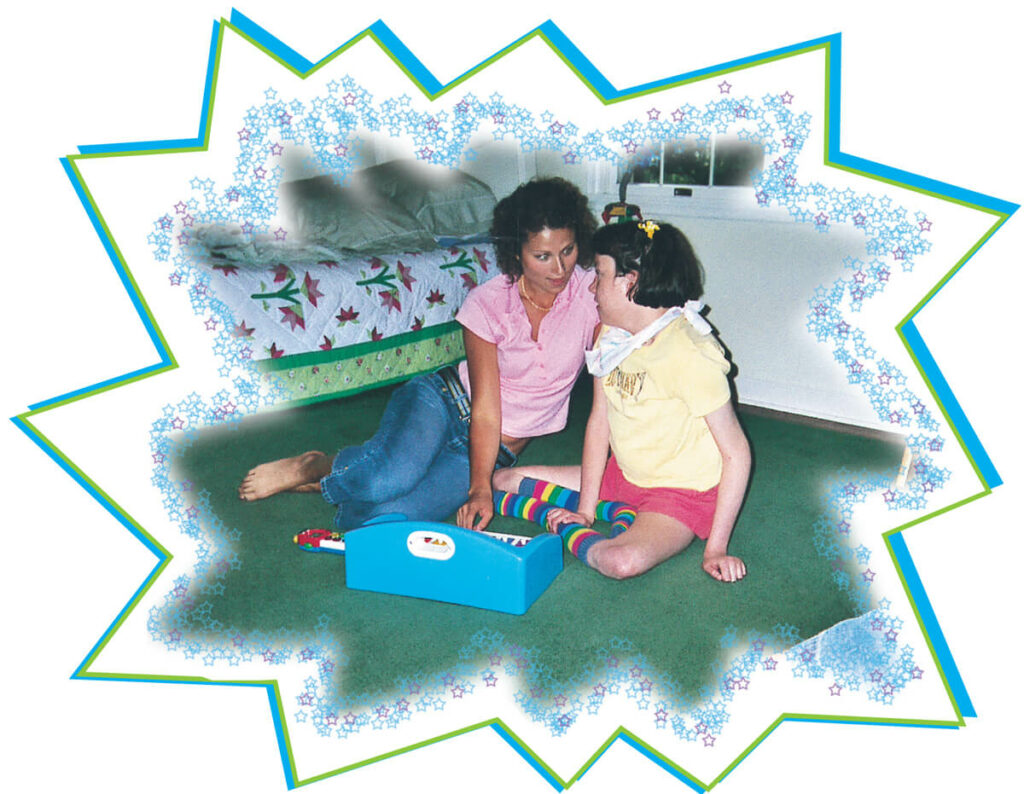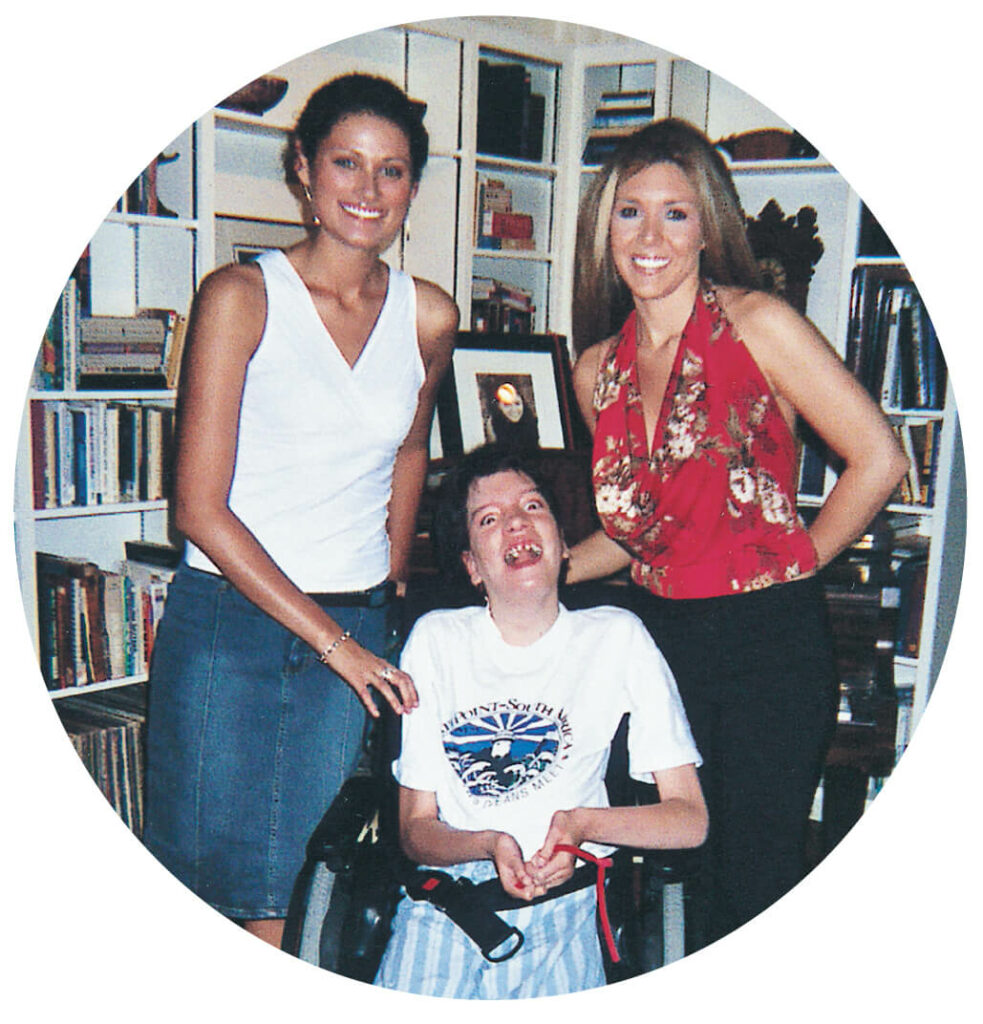by Katie Kromer

Marquelle, or Marky, is a young woman of 15 years who functions at the cognitive level of an 18-month-old child. She is developmentally disabled and physically handicapped because of a chromosome abnormality.
As a sophomore in high school, caring for Marky became one of my weekend babysitting jobs. I worked well in her rigidly scheduled environment with its set times for administering medications, eating, bathing, changing, relaxing, and exercising.
I arrive on Friday night in time to feed Marky dinner. She is sitting in her wheelchair. She has a long, slender body that will never stand fully erect. Her bony legs lift slightly from the footrests, quivering with excitement as I enter. I extend my hand toward her, anticipating her next move. She takes my hand, her skeletal fingers wrap tightly around mine, and she affectionately presses the side of her face against the back of my hand. I linger next to her briefly and then gently tug my hand free to focus on preparing her dinner.
I break Ritz crackers into fourths on the tray that conveniently slides onto the armrests of her wheelchair. She picks up one piece and crunches down on it, relishing the independence of that single motion. Both of our eyes, however, focus on the small television set on the kitchen countertop.
The meal progresses, crackers crunching between my repeated spoonings of the main dish. An appreciative giggle or squeal of delight from Marky interrupts any silence as she reacts to the multitude of voices, colors, and sounds on the television.
Later that night, as I put her to bed, she raises her hands to my face, wiggling all her fingers, a request for “The Itsy Bitsy Spider.” She looks up at me expectantly from a mattress placed on the floor that allows her the independence to crawl freely and safely in and out of bed. I sing the song once, laughing at the applause I get from my audience of one.
Marky’s enthusiastic clapping soon subsides, and she forces her drowsy eyes to stay focused on me, intent on soaking up as much attention as possible. She rests contentedly, tucked in with a Barney pillow and Minnie Mouse sheets. Before I leave the room, I retrieve a towel to wipe away saliva gathering on her chin. I wave good-bye as I exit the room and receive a childlike wave in return.
Marky’s life slowly begins to permeate mine. I no longer immediately wipe away the tiny drop of drool that drips from her mouth onto my shirt. Her room becomes as familiar to me as my own.
The wallpaper is sky blue with clouds embellished upon it. Infant angels with feathery wings and halos float on the ceiling. The room has little furniture, providing Marky an open area to crawl. A television set sits atop a dresser, pushed against one wall. A large turtle-shaped sand box overflows with toys near the door.
The routine I have come to love the most is Marky’s greeting when I first arrive. Whether I enter with a smile on my face, a tired expression, or with tears in my eyes, I know that Marky will scoot her bottom next to mine until our shoulders are touching. She will stare at me with her glistening brown eyes and giggle until her mouth opens wide to expose her crooked, toothy grin and her small shoulders begin to shake.
When I return home after my first year of college, Marky is sick. At Hudson Hospital I find her sitting up in her wheel chair with an IV in her arm and an oxygen canula placed under her nose. It is her second week in the hospital, and pneumonia is still in her lungs. Despite her labored breathing, she manages a smile that glows on her sallow face.
Marky lifts her hands from her lap, her pointer fingers extended, bending up and down in a purposeful motion. I recognize this as her request for the song, “Where is Thumbkin.” I put my hands up in the air and lean my head close to Marky’s ear.
I sing to Marky without thoughts of medications, meals, or diaper changes. I focus completely on her and the exclusive bond that I was unaware had formed so effortlessly between us.
Marky is still coping with chronic respiratory problems. I am her most regular caregiver during the summer months. I travel with her family to their summer home in northern Wisconsin and attend their family functions. This past summer her mother, her older sister, and I packed into the red, handicapped-accessible van to take Marky to Friendship Ventures, a special-needs camp.

Her sister will stay with Marky, because she requires constant care and has never spent a night away from her home. We pull into a rustic collection of small cabins and park the van among the masses of campers and counselors.
As I help settle Marky and her sister into their room, I am suddenly aware of my stomach churning as I walk from one side of the room to the other, unpacking. I notice the bed sitting high above the floor and the multitudes of counselors, to whom Marky’s disabilities are only a concept. I know the vulnerabilities packaged in her brittle body, and I worry that no one else does.
A counselor offers to take Marky, her sister, her mother, and me on a tour of the camp. I eagerly reach for the handles on her wheelchair. I clutch them as a nervous mother would her child’s hand on the first day of school.
Our small party travels the cement paths through small cabins, a dining hall, and a recreational facility all overlooking a calm lake. Marky waves her hands with animated greetings to fellow campers and counselors that pass by; her excitement gradually loosens the white-knuckled grip with which I steer the wheelchair.
I kiss Marky goodbye later that day and leave with her mother. I know my reluctance to leave is only a small taste of the angst her mother is experiencing. At that moment, I feel the most responsibility I ever have for another human being. I know Marky in so many ways. She has been a job, a helpless child, and now a baby sister and friend. I cry, speak, laugh, and sing freely around her in a way that is different from all other relationships in my life.
I know that part of who I am I owe to her. I remain close to her regardless of when my shift ends. I no longer function as her caregiver, but instead as a guardian, cherishing the time I spend with her and worrying over the time spent apart.
As Marky’s mother steers the van away from her fragile daughter, she asks if I think she will be okay. The image of Marky and her sister waving from the stoop of their cabin fades in the distance, but the picture of Marky’s hand reaching to her mouth and confidently blowing a kiss into the air stays in my mind. She is okay, I say. With a kiss and a smile, Marky reveals the optimism, happiness, and resilience that most people struggle to gain in a lifetime.
When I speak of my relationship with Marky, the most common reaction is, “I really admire people like you.” A different response flashes in my mind. I may lift Marky into her wheelchair, but she is the one whose smile spreads widely across her face and whose welcoming hands tenderly guide more people into her life each day.
